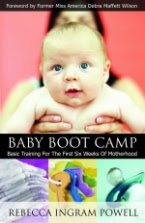WHEN THERE IS NO COMFORT
by Rebecca Ingram Powell
It has been six years since 2-year-old Allie Nicole passed away, the result of a drowning accident in the family’s backyard swimming pool. Now her mother, Kimberly’s, life is divided into two distinct seasons: “Before Allie Died” and “After Allie Died.”
Every year, scores of children die as a result of accidents, illnesses, and crimes. For a parent, there is no grief more consuming. Mothers and fathers grieve not only for the past, but for a future that will be forever unknown. They mourn potential never realized, dreams never fulfilled, and birthdays never celebrated. They suffer from a quiet house, an absent giggle, a vacant lap, and a pair of empty arms. Their lives will never be the same.
Reaching Out to Grieving Families How can you reach out to a family in such sorrowful circumstances? To reach out, you must realize the following about grieving families:
Grieving parents have times when they cannot function normally. “I feel like I have brain damage,” Kimberly admits as she approaches the six-year anniversary of the accident that claimed her daughter’s life. “The trauma to your brain is so great that you just don’t function like you did before. After the accident, I was genuinely frightened. I had five other children to take care of. My train of thought would last about 8 to 10 seconds. I felt totally incompetent in every area of life.”
Clara Hinton, a certified bereavement facilitator and author of the book Silent Grief, understands. Hinton has experienced the pain of losing a child herself. “When a child dies unexpectedly,” she explains, “the grief runs so deep that recovery is often a long, tedious process of hard work.”
Hinton acknowledges that the grieving process is often characterized by “one step forward and two steps back.” For instance, a parent may experience one day of no tears, followed by several days of sobbing, coupled with an inability to function.
“Many parents will say they feel like they are going crazy following a child’s death,” reveals Hinton. “Nothing feels right. Nothing tastes right. The smallest task such as picking out clothes to wear for the day becomes a major ordeal.”
Losing a child disrupts a parent’s expectations of what life and death should be. Parents are supposed to die first — and even that is expected to happen at a certain time, such as when they become elderly. When a child dies, everything seems upside-down.
“Because child loss is such an all-consuming type of loss, so out of context with how life is supposed to be, it takes a long time to get back on track mentally,” agrees Hinton. “The shock of the loss is often too great for the heart to bear all at once. It takes a lot of time to progress from shock to reality.”
Hinton advises friends to treat brokenhearted parents with gentleness and patience. The grieving process is difficult and ongoing. A parent who loses a child is forever recovering, and the continual process of healing must be respected.
Grief is in no hurry. “Our society as a whole does not respond to grief well,” says Kimberly. “If something is unpleasant, we want to get it over with, and grief does not accommodate that. I felt pressured by society to move on.”
Hinton points out that today’s fast-paced society is used to having everything instantly, from microwave dinners to e-mails. Technology has enabled people to live at breakneck speed.
“Unfortunately, we expect the same fast results with grief,” she says. “Pressures placed on parents by our society to ‘hurry up and get over this’ often leave a parent with an added burden of grief, thinking there is something greatly wrong with them because they’ve not moved beyond the daily tears in a timely fashion.”
Grief does not follow a textbook schedule. Two months following their child’s death, some parents are still in shock. By that time, some parents have moved from shock to anger. Others may be at a place where they can talk comfortably about their deceased child. Hinton says all are grieving — each in his or her own way. “There is no right or wrong way to grieve,” she explains.
Brothers and sisters grieve, too. There are often siblings who are greatly affected by the death of their brother or sister. When Diane Stem lost her 16-year-old son, Ricky, she was surprised that people went through her daughter, Stephanie, to ask how she and her husband were doing. It was as though they were not acknowledging that Stephanie, too, had been greatly affected by Ricky’s death.
“My daughter lost her little brother, the partner in every photograph,” she explains. “People can sometimes forget the siblings’ feelings.”
“My older daughters have struggled,” shares Kimberly. “That’s been a difficult process. When you walk through something like this, there’s going to be a natural crisis of belief. When your children ask and you don’t have the answers, it’s hard. It’s hard to see them struggle with their faith and know that you can’t fix it.” This is an area where the prayers of others meant the most to Kimberly. “There were so many people praying for the kids when I couldn’t,” she says.
Men and women grieve differently. “My husband’s way of dealing with grief was to work, do something with his hands,” describes Kimberly, “but I wanted to talk.”
Hinton has seen this scenario time after time. “Seldom are a husband and wife on the same page with grieving the loss of a child,” she says. “A man works through his grief on a level of wanting to ‘fix it.’ He may begin to spend more hours at work, or he will often begin a project in the garage that will keep him up late for nights working with his hands. While he is doing this, he is working through his grief.”
On the other hand, Hinton says that a woman wants to be held and comforted by her husband. When a woman finds her husband is inaccessible to her, she may begin to believe that he is not grieving over the loss or that he does not care about her.In fact, experts report that 80 percent of marriages where a child has died end in divorce.1
It is a tragedy when the grief of losing a child is compounded with the pain of divorce. Both partners are lost in their own private pain, dealing separately with how the loss of their child has affected them. Recognizing and allowing for differences will be a key factor in keeping the marriage together.
“Part of a man’s pain is that he can’t help his wife or his children,” acknowledges Kimberly. “He can’t fix it. He’s used to being the one who lifts up the others, and now he’s down in the trenches with them. It’s a bittersweet place because you have to trust the Lord.”
Six years after Allie Nicole’s death, Kimberly looks at Philippians 4:13 in a different light. “After Allie died, the Lord said, ‘Through Me, because I strengthen you,’ ” Kimberly shares. “I know now I can walk through the death of a child, re-enter life, and live life to its fullest through Him, because He strengthens me. There is hope.”
(1Children’s Cardiomyopathy Foundation™, “Getting Through the Grieving Process,” www.childrenscardiomyopathy.org/main/process.htm.)






















No comments:
Post a Comment